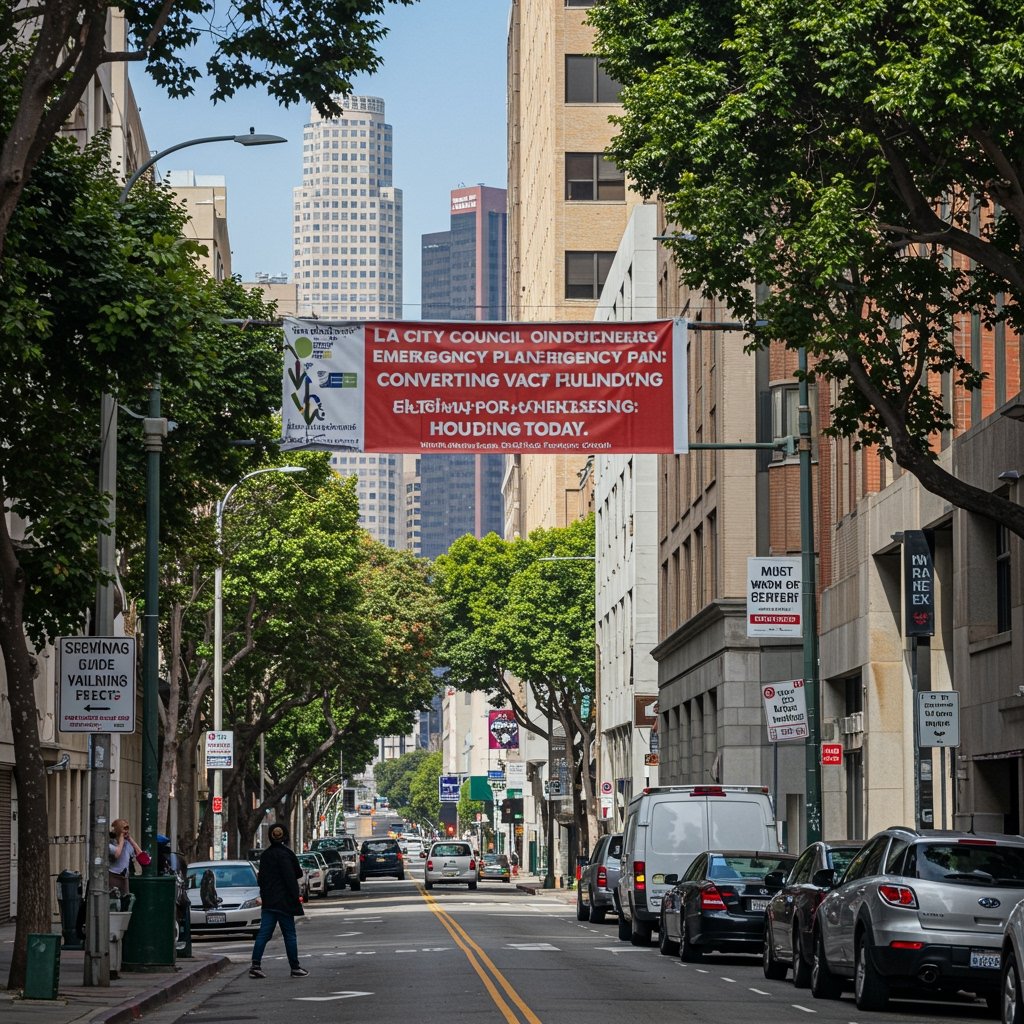LA City Council to Vote on Emergency Housing Plan
Los Angeles stands at a pivotal moment in its ongoing battle against the escalating homelessness crisis. Today, June 7, 2025, the Los Angeles City Council is convened for a crucial special session. The sole item on their agenda is a vote on Mayor Karen Bass’s ambitious and, for many, controversial emergency ordinance, officially known as “Accelerate Home LA” and codified as Ordinance 25-AH. This proposed measure represents a significant departure from traditional housing development processes, aiming for rapid intervention by leveraging the city’s existing, yet underutilized, built environment.
The core tenet of the “Accelerate Home LA” plan is the swift conversion of vacant commercial properties into temporary shelters or housing for individuals experiencing homelessness. To achieve this speed, the ordinance proposes waiving specific zoning regulations and environmental reviews that typically govern such development projects. Proponents argue this streamlined approach is essential to address the humanitarian emergency unfolding on the city’s streets, where thousands lack stable shelter. The Mayor’s office, a leading advocate for the plan, has put forth a compelling statistic: they estimate the initiative could potentially house up to 1,500 people in temporary accommodations relatively quickly if approved and implemented effectively.
Urgency Meets Opposition: The “Accelerate Home LA” Debate
The special session commenced under the stewardship of Council President Paul Rodriguez. In his opening remarks, President Rodriguez underscored the undeniable urgency of the homelessness crisis plaguing Los Angeles. He acknowledged the pressing need for immediate solutions that can deliver results at scale and speed. However, he also candidly highlighted the significant debate surrounding the practical implementation of the ordinance and the valid concerns raised by various stakeholders. This acknowledgment sets the stage for what is expected to be a robust discussion before the council casts its votes.
While the humanitarian imperative drives the plan’s supporters, the measure faces substantial opposition from diverse groups. Notably, business groups have voiced strong concerns regarding the potential implications for property rights. They question the precedent set by bypassing established zoning laws and the potential long-term effects on commercial districts. The ordinance’s emergency nature, particularly its proposed 18-month timeframe, while intended to be temporary, raises questions about the eventual transition and future use of converted properties.
Beyond business interests, community concerns are also at the forefront of the opposition. Many residents and neighborhood organizations are wary of the potential impacts of converted shelters on local areas, citing issues such as safety, neighborhood character, and the strain on local resources. A significant point of contention is the proposed waiver of standard environmental reviews. Critics argue that bypassing these regulations could lead to unforeseen negative environmental consequences and overlook potential health and safety hazards in the rush to convert buildings.
Navigating the Path Forward
The debate over “Accelerate Home LA” encapsulates the complex challenges Los Angeles faces in addressing its homelessness crisis. On one hand, there is a desperate need for immediate housing solutions that can bypass the often lengthy and cumbersome traditional development processes. The sheer scale of the crisis demands innovative and rapid approaches. The Mayor’s office and its allies contend that the emergency powers granted by Ordinance 25-AH are a necessary tool to cut through bureaucratic red tape and bring people indoors before the crisis deepens further.
On the other hand, the principles of due process, community input, and careful planning cannot be easily dismissed. Opponents argue that while the goal is laudable, the method employed by “Accelerate Home LA” risks setting a dangerous precedent by sidestepping regulations designed to protect the environment, ensure public safety, and allow for meaningful community participation in development decisions. The concern is that the urgency of the moment might lead to unintended negative consequences that could outweigh the benefits of rapid conversion.
The Los Angeles City Council’s vote today is not merely a procedural matter; it is a decision that will signal the city’s chosen path in responding to one of its most pressing challenges. The outcome will determine whether Mayor Bass’s emergency vision for leveraging vacant spaces will be given the green light, potentially accelerating housing solutions but also navigating the risks associated with bypassing established regulatory frameworks. As the special session proceeds, the council members are tasked with weighing the immediate humanitarian need against the long-term implications for property rights, environmental protection, and community well-being. The eyes of the city, and indeed the nation, are on Los Angeles today, June 7, 2025, as the council deliberates on a plan that could fundamentally alter the landscape of the city’s homelessness response, at least for the next 18 months.
The vote’s result will undoubtedly shape the strategies and debates surrounding homelessness in Los Angeles for the foreseeable future, highlighting the difficult balance between emergency action and the preservation of established processes and rights.





